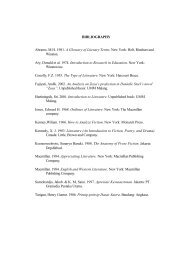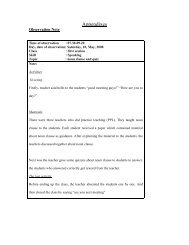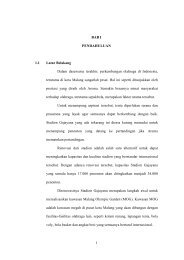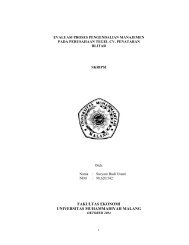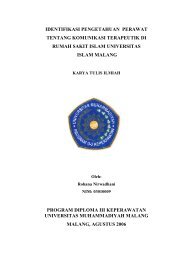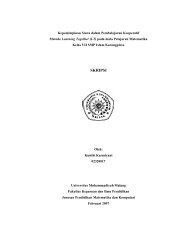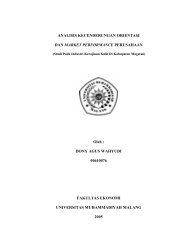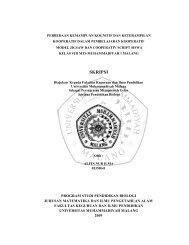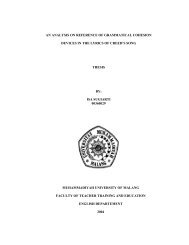File : THESIS.pdf - Universitas Muhammadiyah Malang
File : THESIS.pdf - Universitas Muhammadiyah Malang
File : THESIS.pdf - Universitas Muhammadiyah Malang
You also want an ePaper? Increase the reach of your titles
YUMPU automatically turns print PDFs into web optimized ePapers that Google loves.
• make scientific explanations of the data, observations and conclusions<br />
that they have described, using the skills, knowledge and understanding<br />
that they have acquired from study of the AS Biology syllabus.<br />
Hypotheses that are being tested in AS practical papers will be given,<br />
although hypothesis formulation is in skill B, and thus may be tested in the<br />
theory components. Conclusions may be expressed in terms of support for,<br />
or refutation of, hypotheses, or in terms of the straightforward deductions<br />
or inductions that, logically, can be made from the data, observations or<br />
results of calculations. Simple scientific explanations form a part of such<br />
conclusions and therefore form a part of this practical assessment, in which<br />
the candidates will be expected to refer to knowledge and understanding<br />
gained in their theory part of the course in order to provide explanations of<br />
their practical conclusions.<br />
BIOLOGY 9700 A/AS LEVEL 2007<br />
Suggesting improvements<br />
Candidates should be able to:<br />
• suggest modifications to an experimental arrangement that will improve<br />
the accuracy of the experiment or the accuracy of the observations that<br />
can be made, including the use of new methods or strategies to<br />
investigate the question;<br />
• suggest ways in which to extend the investigation to answer a new<br />
question;<br />
• describe such modifications clearly in words or diagrams.<br />
Candidates’ suggestions should be realistic, so that in principle they are<br />
achievable in practice, although they may include the use of apparatus<br />
that is not available to the candidate (e.g. a colorimeter). The<br />
suggestions may relate either to the apparatus used, to the experimental<br />
procedure followed or to the nature of the observations or the means used to<br />
make them. Candidates may include improvements that they have actually<br />
made while carrying out the experiment, such as repeating readings. The<br />
suggested modifications may relate to sources of error identified by the<br />
candidate or to other sources of error. When asked for modifications,<br />
extensions to answer new questions should not be given.<br />
Apparatus requirements for Paper 3<br />
The apparatus requirements for Paper 3 will vary from paper to paper. A<br />
complete list of apparatus and materials required for each question will be issued<br />
in the Confidential Instructions. The Confidential Instructions should be followed<br />
very carefully. If there is any doubt at all how the practical examinations should be<br />
set up, it is vital that Centres contact CIE as soon as possible.<br />
To give some variation in the questions set, some novel items or equipment or<br />
materials may be required. The list of practical apparatus and materials later in<br />
the syllabus gives details of the requirements that are frequently required.<br />
Candidates should be accustomed to using these.<br />
PAPER 5<br />
Paper 5 will be a timetabled, written paper focussing on the following higherorder<br />
experimental skills:<br />
• planning;<br />
• analysis and evaluation.<br />
128



